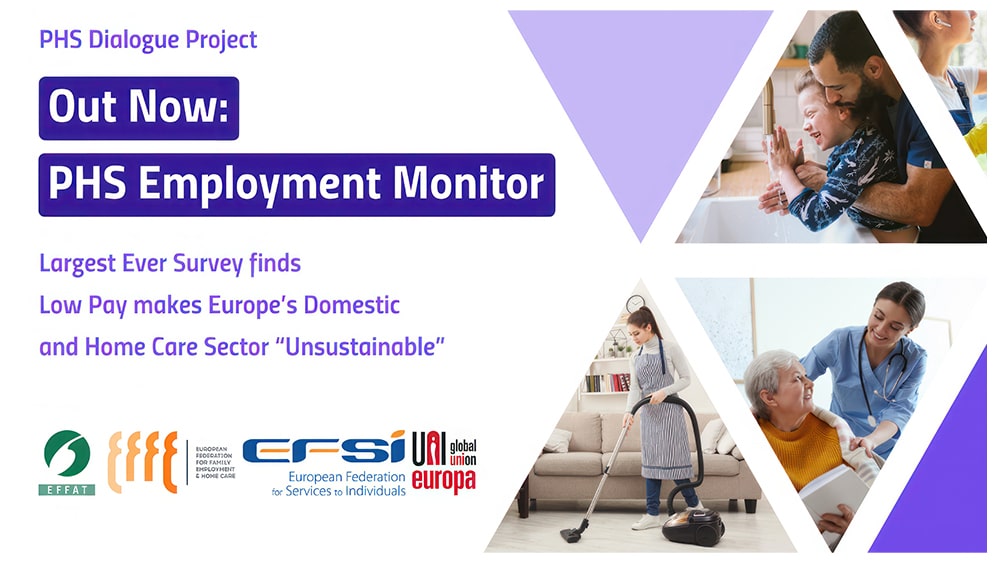The crucial role of Social Dialogue and Collective Bargaining

Working conditions of domestic and home care workers across Europe are not sustainable, according to the recently launched PHS Employment Monitor survey. Most surveyed workers (56.9 per cent) said they will be unable to work in their job until retirement age, while 59.9 per cent of those surveyed – 96 per cent of which are women – said they have considered leaving the sector in the past three years, two-thirds of them (67.5 per cent) because of low pay.
The survey refers to Personal & Household Services (PHS) workers, the official term used by the European Commission. It is the largest-ever survey produced in Europe in the PHS sectors. Jointly commissioned by social partners European trade union federations UNI Europa and EFFAT and employer organizations EFFE and EFSI, the survey collected the responses of more than 6,500 PHS workers, employers, and service users from 26 countries.
The results point to an ongoing and serious crisis of labor shortages and turnover in a sector that accounts for an estimated 4 per cent of total employment in the EU. Workers, employers, and service users or users-employers alike see the sector as undervalued, in terms of perception, pay, and public funding. As a PHS employer in France testified: “The salary is not attractive, they do not want to work in this sector or when they work there, it is not the priority.”
According to a worker from Slovakia, “you will only crawl to retirement with burnout. It’s a shame because I like this job, but after 18 years, enough is enough. I’m on my way out.” That is particularly worrying given Europe’s demographic crisis, with the ratio of the population over 65 projected to increase from one fifth to one third by 2050.
The survey suggests that social dialogue and collective bargaining at the European level need to be strengthened for working conditions and quality care as well as domestic services to improve. The findings also underline the important role of users-employers within the PHS sectors. Most of them believe they would benefit from representation by an employer’s organization that could negotiate minimum standards in the sector with trade unions. Moreover, more than half (60.8 per cent) of those employers surveyed whose workforces are not covered by a collective bargaining agreement, say they are open to signing a collective agreement. The majority of PHS users who responded to the survey said they would prefer to use a company or organization that has a collective agreement with trade unions governing the working conditions of PHS workers in their homes.
The survey shows that workers, employers, and many service users, users-employers agree that the PHS sectors lack the public and institutional recognition to match their importance and contribution to society, thus exacerbating the low pay and poor conditions that drive workers to look elsewhere. That is in line with PHS social partners’ demands in their joint reaction to the European Care strategy. The lack of recognition is also deeply linked to a lack of public investment in the sector.
In this context, trade unions and employers’ organizations engaged in social dialogue in the PHS sectors can have a crucial role: the results of the survey show that there is significant room for improvement through collective bargaining at all levels. It outlines further solutions ranging from the formalization of the sector to educational efforts to improve the image of PHS work for workers and users, to increased state funding to resolve the tension between high prices and low wages in the sector, and to overall improved working and living conditions.
Other key findings include:
- The majority of PHS workers reported their jobs as being mentally taxing. Among those who work 40 hours or less per week, 50 per cent said their job has caused mental health problems such as stress, anxiety, or burnout. Among those who work more than 40 hours per week, this number rises to 65.8 per cent.
- Nearly all the PHS provider organizations surveyed (96.7 per cent) indicated that they have implemented at least some measures to reduce labor turnover. The most common measures implemented by employers are wage increases, efforts to improve workers’ mental health and well-being, access to training and career development opportunities, as well as additional non-wage benefits. In this regard, many pointed out that increased state support and public investment is the only viable solution.
- While forming an important part of the sector, migrant PHS workers experience a significantly worse work-life balance. 38.2 per cent of migrant PHS workers said that their job does not allow for a good work-life balance, compared to 27.5 per cent of non-migrant workers who said the same. Likewise, significantly more have considered leaving the profession in the past three years.
- 40 per cent of migrant workers faced administrative difficulties related to their migration status when trying to find PHS work. The additional critical challenges of being undocumented migrant workers, can be a barrier to declared work, which translates into lack of recognition, rights, and protection, as reported by a PHS cleaner from the Netherlands: “I am undocumented in NL and the government does not recognize my work here, so I do not have benefits like paid sick leave.”
- Service users and users-employers unanimously highlighted their sense of the “disaster” that would await them if they no longer had access to PHS workers for their homes. Some who have PHS care workers in their homes expressed how they would have no choice but to move parents and other loved ones into assisted living and out of their homes. Likewise, many women who receive PHS services at home shared their recognition that, without the help of these workers, they would find their career opportunities more constrained and their quality of life reduced.
Undeclared work is a plight of the PHS sector: although difficult to measure, survey evidence suggests that a lack of regulation, collective bargaining, and government support leads to a higher risk of undeclared work in the PHS. In this regard, provider organizations and service users agree on the perceived motivation behind undeclared work. 66.2 per cent of PHS provider companies surveyed identified the ‘higher labor cost of declared work’ as being a key driver of undeclared work.
UNI Europa Regional Secretary Oliver Roethig remarked: “Homecare and PHS workers have an essential role in sustaining life and shaping the future of European society. Yet, our survey shows that too often they remain undervalued and lack the recognition they deserve. This can only be changed through strong social dialogue and collective bargaining at all levels to improve pay and conditions for workers across Europe. As European social partners in PHS, today we reaffirm our joint commitment towards increased recognition for the PHS workers and sectors in Europe: this study is a proof that the activities of the PHS social partners will need support and financing in the years to come.”
For EFFAT General Secretary Kristjan Bragason, “this survey’s exercise is a landmark demonstration of the commitment of all PHS social partners to increase the recognition of the sector. After all, domestic work accounts for 4 % of EU employment. It is time for it to be recognized as any other sector of the economy, governed by viable industrial relations and decent working conditions. Workers and employers agree strengthening social dialogue and collective bargaining is the way forward and we’re on the right path.”
EFSI President, Delphine Chilese-Lemarinier stated that “the PHS Employment Monitor gives body to well-known realities and challenges of our sector, which were impossible to quantify at the European level until now. It paves the way for joint work towards common and coordinated actions to ensure the sector’s sustainability for the benefit of all: workers, employers, and service beneficiaries. The report’s findings align with EFSI’s long-term commitment to pursue a structured and stronger social dialogue towards granting PHS workers and employers the support they deserve and bringing them out of the shadows.”
EFFE General Delegate Aude Boisseuil declared: “As our survey reveals, the domestic and home care sector stands at a critical juncture, facing unprecedented challenges exacerbated by persistently low pay and demanding working conditions. Urgent action is needed to ensure the sustainability and vitality of this essential sector, which plays a fundamental role in supporting our communities and addressing the needs of an aging population. Robust social dialogue, encompassing both workers and household employers, is pivotal. It’s time for stakeholders across Europe to come together, engage in meaningful dialogue, and implement reforms that prioritize the well-being of workers and the quality of care provided to those who depend on it.”







